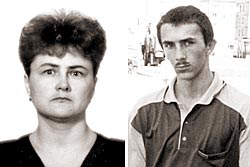Оn July 21, 2005, at 6.00 a.m., Lyudmila Zhorovlya, a human rights defender, and her 21 year old son Konstantin Zhorovlya, were shot dead in the city of Vorkuta, Republic of Komi, Northern Russia.
Lyudmila Zhorovlya assisted residents in lawsuits against city authorities, calling for compensation for steep hikes in utilities bills. In July 2004, she succeeded in obtaining the abrogation of the Mayor’s Order n° 677 in the court, pursuant to an appeal she had filed. This order required inhabitants of communal housing to pay overpriced rent. The overturning of the order resulted in reimbursement of the extra rent.
In 2005, Ms. Zhorovlya had reportedly started to investigate the reasons that had led to the overpricing of public utilities. The Mayor of Vorkuta, Igor Shpektor was unhappy about it. As a result, Zhorovlya received multiple threats demanding she stop her investigation. Receiving threats in September and December 2004, as well as in January 2005, she informed a Vorkuta prosecutor, only to be ignored. On July 20, 2005, threats against her multiplied, ultimately leading to her death. The threats seemed to increase notably after she promised to sue city authorities over compulsory charges for a television antenna. Produced by Antenna Sluzhba, a local company belonging to the son of a high civil servant of Vorkuta, these antennas were installed whether residents wanted them or not, resulting in yet another over charging of public utilities.
